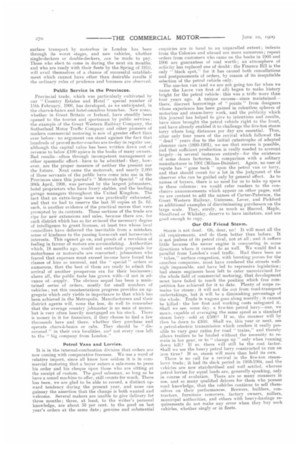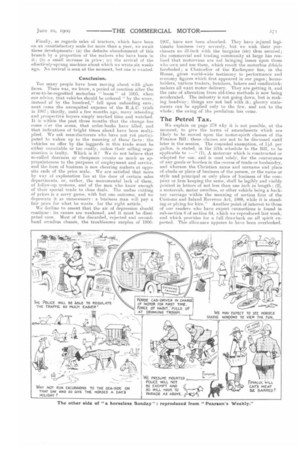Our Old Friend Steam.
Page 2

Page 3

If you've noticed an error in this article please click here to report it so we can fix it.
Steam is not dead. Oh, dear, no! It will meet all the old requirements, and do them better than before. It is not jealous of its petrol rival, not at all ; and it suffers little because the newer engine is conquering in some directions where it cannot do as well. We would find a parallel from London's road traffic. Had there been no
tubes," surface congestion, with bursting purses for the omnibus companies, must have rendered the streets wellnigh impassable, and have led to repressive legislation; had steam engineers been left to cater unrestrained for the whole field of commercial motoring, that development must have failed to reach the position which free cornpetition has achieved for it to date. Plenty of scope remains for steam; it will not die out from road-transport undertakings, but it will be a diminishing percentage of the whole. Trade in wagons goes along merrily ; it cannot be killed : the low first and working costs safeguard it. Shall we see, some day, a five-ten petrol lorry—one, we mean, capable of averaging the same speed as a standard steam lorry-sold at £500? If se, the steamer will by then be down to £350. Shall we. this year or next, see a petrol-electric transmission which renders it. really possible to vary gear ratios for road " trains," and thereby allows trailers to be hauled without the necessity to remain in low gear, or to " change up " only when running down hill? If so. there will still be the cost factor. Shall we see the heavy petrol lorry constructed to run on iron tires ? If so. steam will more than hold its own.
There is no call for a revival in the five-ton steamlorry trade; it had its slack period in 1903-1904. and the vehicles are now standardised and well settled, whereas petrol lorries for equal loads are, generally speaking, only in course of evolution. There are so many steamers in use, and so many qualified drivers for them who possess road knowledge, that the vehicles continue to sell themselves on their performances. Brewers, builders, contractors, furniture removers, factory owners, millers, municipal authorities, and others with heavy-haulage requirements do not make any error when they buy such vehicles, whether singly or in fleets.
k'inally, as regards sales of tractors, which have been on an unsatisfactory scale for more than a year, we await three developments: (a) the definite abandonment of this branch by a proportion of the makers who have been in it (b) a small increase in price; (c) the arrival of the effectively-sprung machine about which we wrote six weeks ago. No revival is seen at the moment, bat one is wanted.






















